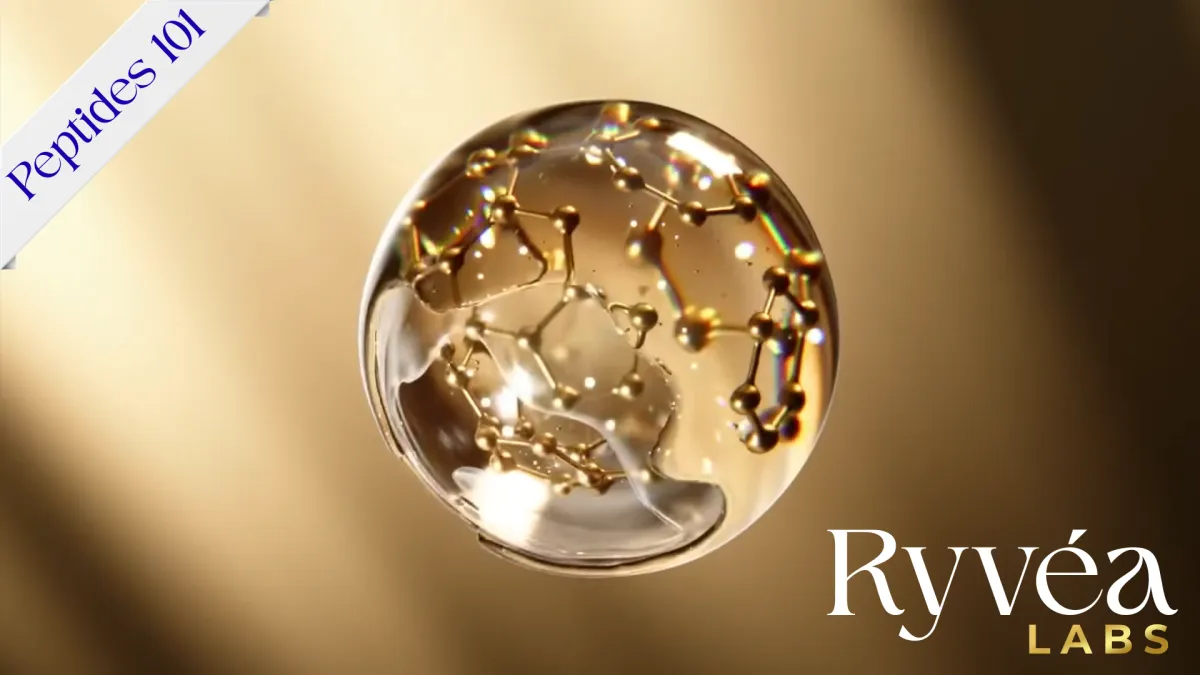
What Are Peptides and Why Are They So Popular Right Now?
What Are Peptides and Why Are They So Popular Right Now?
“Peptides are small chemical messengers that tell our cells how to behave—like text messages between parts of your body.” —Dr. Andrew Huberman, Neuroscientist
Disclaimer: This is a publicly sourced quote, used for educational context only.

Introduction
Peptides may sound like a complex scientific concept, but in reality, they're already part of your daily life—whether you know it or not. They're behind some of the biggest trends in health, fitness, skincare, and wellness right now. And as more people look for precise, targeted ways to support their body’s natural systems, peptides have quickly become one of the most talked-about tools in the modern wellness toolkit.
In this post, we’ll break down what peptides are, why they’re so powerful, and why their popularity has exploded in 2025.
What Exactly Is a Peptide?
At the simplest level, peptides are short chains of amino acids—the same building blocks that make up proteins. But unlike full-size proteins, which are long and complex, peptides are short and efficient. They’re like tiny command signals that your body naturally uses to communicate.
Think of it this way: if proteins are long novels, peptides are quick sticky notes—short, direct messages telling your body what to do. These messages can influence everything from how your skin looks to how your muscles recover after exercise.
Your body produces peptides naturally, but many people are now exploring synthetic versions that are designed to mimic or amplify these natural signals.
Peptides vs. Proteins: What’s the Difference?
While both peptides and proteins are made of amino acids, size and function set them apart. Proteins often have structural roles or act as enzymes, while peptides are more about communication. Their smaller size means peptides can often be absorbed more easily or act more quickly in targeted ways.
This is one reason why peptides are being explored in so many areas—from skincare and joint support to cognitive function and metabolic health. They can be designed with a very specific task in mind.
Why Are Peptides So Popular in 2025?
Over the past few years, peptides have moved from niche science circles into the mainstream. There are a few key reasons for that surge:
First, the science has caught up. We now have better technology to produce peptides safely, consistently, and affordably. Researchers can design specific peptides for specific roles—supporting muscle growth, aiding recovery, enhancing skin health, or even influencing hunger and metabolism.
Second, the public is more aware. High-profile wellness influencers, medical experts, and podcasts like those hosted by Joe Rogan and Andrew Huberman have brought peptides into everyday conversations. The rise of self-optimization and personalized health has created a perfect environment for peptides to thrive.
And finally, some of the most talked-about drugs in weight management and anti-aging—like semaglutide (Ozempic) and tirzepatide (Zepbound)—are peptides. Their success has shined a spotlight on what these tiny molecules can potentially do.
Common Ways Peptides Are Being Used
Peptides are now found in a wide range of consumer products, from over-the-counter skincare to prescription medications. Some of the most popular categories include:
Skincare:
Peptides like GHK-Cu and Argireline are used in creams and serums aimed at improving skin texture and elasticity. They may help support collagen production and reduce the appearance of fine lines.
Supplements:
Collagen peptides are a staple in the supplement world, often used to support joint, hair, and skin health. These are derived from natural sources and are broken down so your body can absorb them more easily.
Therapeutic & Research Peptides:
Then there are more specialized peptides—like BPC-157 for injury recovery or CJC-1295/Ipamorelin for growth hormone stimulation—which are typically labeled as “research use only” and not approved by the FDA for human use. Despite that, many people in the biohacking and fitness communities have experimented with them in non-clinical settings.
Are Peptides Safe and Legal?
This is one of the most common—and important—questions.
The short answer is: it depends on the peptide.
Some peptides, like collagen and certain cosmetic ingredients, are regulated as dietary supplements or topical ingredients and are widely considered safe for general use. Others, like semaglutide, are prescription medications approved by the FDA for specific medical conditions.
However, many peptides available online fall into a legal gray area. They’re often sold as “research chemicals” with disclaimers like “not for human consumption.” These are not approved for safety or effectiveness by the FDA, and using them carries potential risks.
If you're considering peptide use beyond supplements or cosmetics, it's essential to speak with a licensed healthcare provider and fully understand the source, quality, and intended use of the compound.
For detailed guidance on safe use and sourcing, visit Safety Page
Need help calculating proper measurements? Use our Dosage Calculator and Reconstitution Calculator for support.
What You Can Do Next
If you're curious about peptides, the best place to start is with education. Learn about the types, the potential benefits, and how they’re being used both in science and wellness communities.
We’ve created a full Peptides 101 Free Ebook to walk you through the essentials. For deeper insights into therapeutic applications, explore the Peptides Therapies!
When you’re ready to explore trusted formulations, visit our Product Page see the latest research-backed offerings.
Final Thoughts
Peptides may be small, but they’re powerful. As science continues to unlock their potential, these molecules are shaping the future of personalized wellness. Whether you're aiming to support your skin, your joints, or your overall vitality, peptides offer a promising frontier—but they also require care, education, and respect.
Always research thoroughly, use high-quality sources, and when in doubt, consult a professional.
